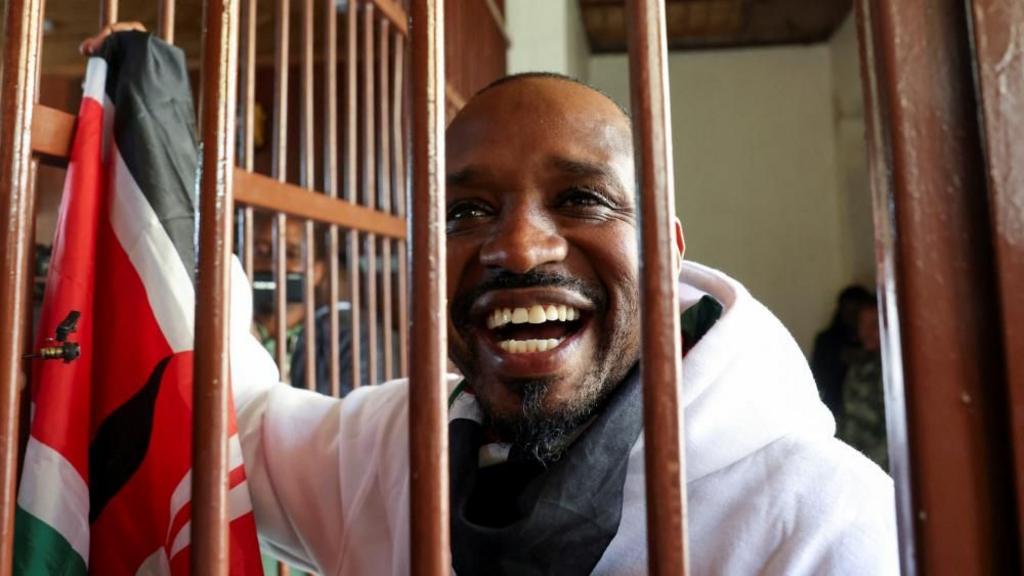Boniface Mwangi, a prominent Kenyan activist, has been formally charged with the illegal possession of ammunition. The charges are reportedly linked to protests that occurred last month, during which at least 19 individuals lost their lives.
Mr. Mwangi has denied the allegations and has been granted bail following his arraignment.
Contrary to initial statements made by the police, Mr. Mwangi was not charged with “facilitation of terrorist acts.”
On Sunday, investigators stated that a search of Mr. Mwangi’s residence in Lukenya, on the outskirts of Nairobi, yielded the seizure of phones, a laptop, and notebooks. Additionally, hard drives, computers, tear gas canisters, and a blank firearm round were reportedly recovered from his office in the city.
The arrest of Mr. Mwangi, particularly the initial suggestion of terrorism charges, elicited widespread condemnation. Human rights organizations have characterized the move as an attempt to suppress dissenting voices. The activist has refuted the accusations, stating on X: “I am not a terrorist.”
The alleged offenses are connected to anti-government demonstrations on June 25. According to the state-funded Kenya National Commission on Human Rights (KNCHR), 19 people died during clashes between demonstrators and law enforcement. The unrest also resulted in hundreds of injuries and damage to property and businesses.
The KNCHR reports that the majority of fatalities on June 25 were caused by gunshot wounds, with human rights groups attributing the blame to the police.
However, Interior Minister Kipchumba Murkomen characterized the demonstrations as “terrorism disguised as dissent” and an “unconstitutional attempt” to destabilize the government. He further stated that several police stations were attacked, resulting in injuries to numerous officers and the burning of vehicles.
According to AFP news agency, the search warrant used by police to raid Mr. Mwangi’s home and office accused the activist of paying “goons” to incite unrest during the protests.
Speaking to supporters and journalists outside the courthouse on Monday, Mr. Mwangi stated, “The president thinks that the anger against his government is manufactured and people are being paid.”
“People hate [Kenyan President William] Ruto for free,” he added.
Holding a Kenyan flag and wearing a T-shirt emblazoned with the words “I love my country,” Mr. Mwangi asserted that he had never worked with “goons” in his “entire life.”
As he entered the courtroom, fellow activists and supporters, who had gathered to express their solidarity, sang the national anthem.
The KNCHR reports that at least 38 additional individuals were killed in subsequent protests earlier this month.
Since June of last year, over 100 people have been killed in successive waves of anti-government protests. Police have been accused of using excessive force to quell these demonstrations, which has, in turn, fueled further protests.
President William Ruto has urged the police to shoot violent protesters in the leg, rather than fatally wounding them.
On Sunday, a coalition of 37 rights organizations condemned Mr. Mwangi’s arrest on “unjustified terrorism allegations,” describing it as the “latest escalation in a systematic crackdown that has seen hundreds of young Kenyans detained on fabricated terrorism charges.”
“What began as targeted persecution of young protesters demanding accountability has metastasized into a full-scale assault on Kenya’s democracy,” the organizations stated in a joint statement.
James Orengo, a veteran politician and governor of Siaya county, stated that it was “ridiculous to charge Boniface Mwangi and our children who have demonstrated a high level of political consciousness with terrorism.”
Mr. Mwangi has been detained on multiple occasions in the past and has been a central figure in numerous protests.
In May, he and a Ugandan activist, Agather Atuhaire, were detained in Tanzania, where they had traveled to attend the trial of Tanzanian opposition leader Tundu Lissu, who faces treason charges.
Following their release several days later, both individuals stated that they had been abducted, tortured, and sexually assaulted. They have since filed a case at the regional East African Court of Justice regarding the matter.
Mr. Mwangi is widely regarded as one of Kenya’s most prominent and fearless activists, with a significant portion of his life dedicated to the pursuit of social justice.
He has been a visible presence in numerous protests, some of which have been characterized by dramatic and symbolic actions. This includes a 2013 demonstration in which he brought piglets covered in blood to the gates of parliament to protest “greedy MPs” who were demanding a pay increase.
In 2024, he called on people to bring coffins to the streets as a symbol of what he characterized as MPs taxing Kenyans “to death” and to represent individuals killed by police during protests.
He has been beaten, arrested, and detained on numerous occasions for his bold and provocative actions. He has often spoken about the physical and emotional scars resulting from his years of activism, yet he remains undeterred.
A former photojournalist, Mr. Mwangi gained global recognition for his documentation of the deadly violence that followed the 2007 election. His powerful images captured the gravity of the crisis, during which over 1,000 people died and 350,000 were displaced from their homes.
He subsequently won the CNN Africa Photojournalist of the Year Award in 2008.
Mr. Mwangi has stated that the experience of documenting these images had a profound personal impact on him and left him disillusioned. He subsequently transitioned to activism and has since received other accolades, including being named among the top 100 most influential Africans by New African magazine in 2020.
Go to BBCAfrica.com for more news from the African continent.
Follow us on Twitter @BBCAfrica, on Facebook at BBC Africa or on Instagram at bbcafrica
Paul Biya is the world’s oldest president and wants to show he is on the pulse, but many are not convinced.
Workers reported feeling vibrations in the partially built structure, and being told to cover up holes with sand.
The declaration says both parties must sign a final peace deal by mid-August.
The Somaliland community in Cardiff has existed for more than 150 years.
Mkhwanazi’s explosive claims have resulted in a suspension and the launch of two inquiries.

